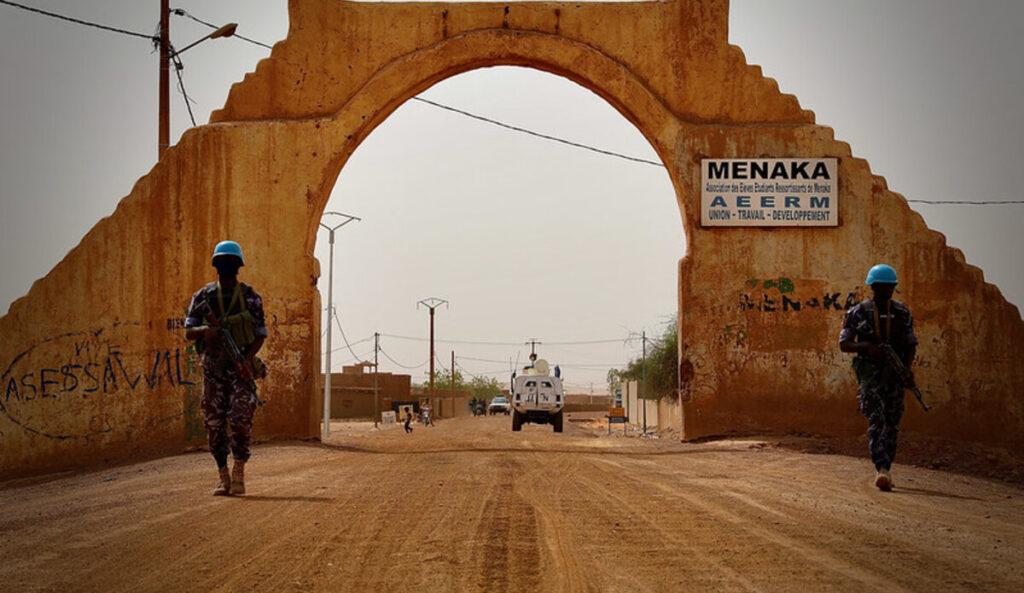ADF STAFF
Experts say an Islamic State group affiliate’s recent actions in northeast Mali signal that the group has entered a new phase and believes it is unchallenged by the military-led government.
The extremists seized the northeast Malian town of Tidermene on April 10 without a fight. They gathered residents, distributed leaflets and told them to prepare to pay zakat, an Islamic tax.
“Now they are trying to govern,” France 24 terrorism expert Wassim Nasr said during an April 13 broadcast. “They are the same leaflets that were distributed in Syria back in 2014, meaning that we are in a new phase of trying to gain the hearts and minds of the population after confirming their superiority over other factions.”
The Islamic State Sahel Province (ISSP), as the group is now known, has waged a major offensive throughout Mali’s tri-border region with Niger to the east and Burkina Faso to the south.
For more than a year, ISSP has fought off rival extremists linked to al-Qaida, locals’ militias and the Malian military, which has a limited presence in the area.
“For a year, civilians have had to make a choice in the absence of the Malian state,” Nasr said. “They have had to choose sides either with al-Qaida or the Islamic State.”
Reprisal attacks are common as the terror groups accuse civilians of aiding their rivals or the government.
Bram Posthumus, a journalist and Sahel expert based in Abidjan, Côte d’Ivoire, said the conquest of the strategic village of Tidermene was part of a coordinated ISSP effort to take control of the Menaka region.
“Villages have been attacked, markets have been attacked, people have been leaving and people have been flowing to the three major centers in that region,” he told the BBC.
Local communities have reported nearly a thousand deaths in the fighting over the past year, Radio France Internationale said. The population of Menaka has tripled during that time because of an influx of displaced people who fled attacks in nearby communities, according to United Nations data.
El-Ghassim Wane, head of the U.N. stabilization mission in Mali (MINUSMA), condemned the extremist groups targeting civilians.
“In the city of Menaka, over 30,000 people have already taken refuge since last year,” he said to the Security Council in April. “The influx of internally displaced persons has increased pressure on the humanitarian response, with the population manifesting urgent needs related to clean water, food, medicine and shelter.”
Tidermene is about 75 kilometers north of Menaka. Previous attacks by ISSP in recent months reveal an effort to encircle the region’s only urban center.
“Menaka is now under direct threat from Islamic State,” Posthumus said. “Tidermene was the last place where there was a free access route into Menaka.”
The town could fall into the hands of ISSP, giving it an urban center from which it could gain revenue and launch attacks.
“The Islamic State is quite clearly targeting the border,” Posthumus said. “It wants to control large chunks of the border, especially with Niger. And then it’s got a base. It’s got a place from where it can operate, and they will be very difficult to dislodge from there.”
The Malian military and its hired Russian Wagner Group mercenaries still have a presence in Menaka, as does MINUSMA.
When asked about the capture of Tidermene, an army officer told Agence France-Presse: “The Malian army controls Menaka and is ensuring the protection of civilians.”
In December 2022, however, a brazen ISSP attack on Malian military barracks outside the town of Tessit in the neighboring Gao region showed the unwillingness of Mali’s army or the Wagner mercenaries to leave their bases.
“They are present, but they have no military gains on the ground, neither in the center nor in the northern part of Mali,” Nasr said of the army and the mercenaries. “The Malian authorities are just watching and unable to fight those jihadi groups. They don’t have the means. Even Wagner doesn’t have the means.
“The safe haven that the Islamic State sought to create since March 2022 is today fulfilled.”

